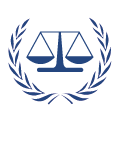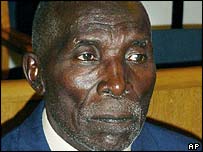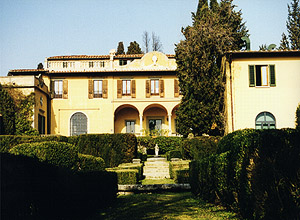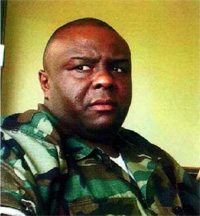I attended three panels, the first of which was my own panel on accountability, which was chaired by Prof. Bill Bowring of Birkbeck College, UCL in the UK. There were three papers presented, which at first glance seemed to have little in common. They addressed IHL and justice in the Colombian armed conflict (Prof. Rafael Prieto Sanjuan from the Poltifical University Javeriana in Colombia), the Draft Convention on the Criminal Accountability of UN Officials and Experts on Mission (my own paper), and whether criminal accountability or civil liability is a more effective approach for redressing environmental consequences of armed conflict (Tara Smith of the Centre for Human Rights, University of Galway, Ireland). However, Prof. Bowring brought these together by noting how the issue of accountability can be problematic in many different areas of IHL, with immunity and impunity remaining pervasive in different fields. He pointed out that each of the papers demonstrated the existence of idealistic law making, which is in stark contrast to the political reality and the application of such laws. This could be seen in the difficulty experienced in Colombia in implementing laws in accordance with the Rome Statute of the ICC and that state’s efforts to ensure accountability for violations of IHL during its ongoing armed conflict; the problems within the UN and its member states of ensuring accountability for all categories of peacekeeping personnel for crimes committed whilst engaged in a peace support operation; and the lack of action taken over history for environmental crimes committed in armed conflicts such as in Vietnam (the defoliation of forests using chemical agents) and Iraq (the burning of oil fields).
The second panel I attended was on implementation and weapons. The papers were all starkly different in their subject material. One took an overall introduction to international criminal justice. Unfortunately, this paper was very basic, and did not particularly offer up a challenging discussion among the participants. Another paper addressed the impact of the US military commissions on the development of IHL. This paper was particularly interesting, and it is a shame there was not more time to develop the points made by Dr. Poretto from the University of Western Sydney in Australia. Dr. Poretto questioned the weight that should be given to decisions made by first instance military judges in relation to the development of IHL internationally, determining instead that such a judgement does not have the importance of (for example) a judgement on appeal to the Supreme Court. The third paper in the panel was delivered by Bonnie Docherty of Harvard Law School, who is an expert in cluster munitions. through her work with Human Rights Watch She was involved in the drafting of the recently adopted convention on cluster munitions, and gave a very informative presentation on the convention, including its unique and breakthrough aspects such as the requirement for sending states to provide assistance to victims of cluster munitions.
The final panel I attended was on peace, security and justice, and considered a couple of very relevant and topical issues: the relationship between the ICC and truth commissions (Madalena Pampalk, University of Vienna, Austria), and Article 16 of the Rome Statute in relation to Uganda (Yassin M’Boge, Queens University Belfast, UK). Both papers enabled discussion about controversial aspects of the Rome Statute and the potential challenges for application of provisions that have not yet been applied by the Court- or the Security Council. Ms M’Boge emphasised that justice and peace do not have to be mutually exclusive, and that the involvement of the ICC in the Ugandan situation does not mean that peace cannot occur. Ms Pampalk looked at the examples of truth commissions in Sierra Leone and Timor Leste in order to analyse the potential of the ICC to work with truth commissions, and what potential agreements such bodies could make, such as the sharing of information.
Aside from the scholarly stimulation, the Symposium was a surprisingly social event too. The emphasis on participation by early career academics and PhD candidates meant that there was no real separation of groups of people at the social events, and thus there was a very positive and communal sentiment amongst the symposium attendees. The dinner was enjoyed by all, with a number of attendees staying quite some time at the bar afterwards!
The only downside of the Symposium turned out to be the no-shows of previously scheduled experts Nigel White and Nico Shrijver, but it was a minor disappointment in a very enjoyable and interesting Symposium. We look forward to the next one!

 Since Tobi is currently summerschooling in The Hague, it probably falls to me to announce ECHR decision in the case of Gaeffgen v. Germany. Magnus Gaeffgen was convicted for the kidnapping and murder of an 11 year old child; during the initial investigation, German police had threatened him with torture to get him to reveal where he had hidden the child, who they believed to be alive but in danger of dying. The decision is
Since Tobi is currently summerschooling in The Hague, it probably falls to me to announce ECHR decision in the case of Gaeffgen v. Germany. Magnus Gaeffgen was convicted for the kidnapping and murder of an 11 year old child; during the initial investigation, German police had threatened him with torture to get him to reveal where he had hidden the child, who they believed to be alive but in danger of dying. The decision is  Trial Chamber I of the International Criminal Court has, as of last Friday, struck a blow to the Prosecutor, by staying – possibly forever – the Court’s most advanced case. Moreover, the Trial Chamber didn’t exactly hold back in its criticism of the Prosecution. It held that the Prosecution had seriously violated the defendant’s right to a fair trial, and further that the violation had ‘ruptured [the trial process] to such a degree that it is now impossible to piece together the constituent elements of a fair trial.’ Now that’s tough. The
Trial Chamber I of the International Criminal Court has, as of last Friday, struck a blow to the Prosecutor, by staying – possibly forever – the Court’s most advanced case. Moreover, the Trial Chamber didn’t exactly hold back in its criticism of the Prosecution. It held that the Prosecution had seriously violated the defendant’s right to a fair trial, and further that the violation had ‘ruptured [the trial process] to such a degree that it is now impossible to piece together the constituent elements of a fair trial.’ Now that’s tough. The  By Björn Elberling
By Björn Elberling Firstly, let me comment on how spectacular the location was! The EUI is located in several different villas on a hill in Florence, and the conference was held in one of these villas and its chapel. The views were stunning, and the villa even has a beautiful sculpted garden and its own soccer field! A very nice place to work and study, indeed!
Firstly, let me comment on how spectacular the location was! The EUI is located in several different villas on a hill in Florence, and the conference was held in one of these villas and its chapel. The views were stunning, and the villa even has a beautiful sculpted garden and its own soccer field! A very nice place to work and study, indeed!  By Björn Elberling
By Björn Elberling As reported by the Court already on Saturday, there has been a first arrest concerning the Central-African Republic situation before the ICC. Jean-Pierre Bemba, leader of the "Movement for the Liberation of the Congo", former vice-president of the DR Congo transitional government and losing candidate in the 2006 presidential elections, has been arrested by Belgian authorities on the basis of an arrest warrant against him issued under seal on Friday. This warrant has now been made public – Bemba is
As reported by the Court already on Saturday, there has been a first arrest concerning the Central-African Republic situation before the ICC. Jean-Pierre Bemba, leader of the "Movement for the Liberation of the Congo", former vice-president of the DR Congo transitional government and losing candidate in the 2006 presidential elections, has been arrested by Belgian authorities on the basis of an arrest warrant against him issued under seal on Friday. This warrant has now been made public – Bemba is